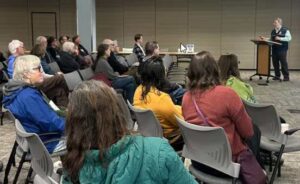
More than 150 community members and scientists recently gathered for the 2024 Kodiak Area Marine Science Symposium (KAMSS), which featured presentations, a poster session paired with youth science activities, tours of the NOAA ship Oscar Dyson, several film showings, and more. KAMSS once again partnered with the month-long Kodiak Whale Fest to offer place-based marine science education.
Rick Thoman of the Alaska Center for Climate Assessment and Policy at UAF provided a keynote address on Kodiak’s changing climate. “Rick walked us through Kodiak’s climate records, current weather and climate observations predicted climate variability and change,” explained Julie Matweyou, Alaska Sea Grant Marine Advisory Agent for Kodiak and organizer of the event. “His presentation really set the stage for other presentations and discussions on marine ecosystem changes and community resilience in the face of change.”
Several partner-led activities occurred in conjunction with KAMSS, including a salmon shark dissection by local science teacher John Malloy, where more than 80 youth and adults learned about shark anatomy and physiology. This activity is possible thanks to the fishermen who donate animals, NOAA who holds the sharks for educational outreach, and the teachers, scientists and volunteers who offer their time and expertise.
“The richness of KAMSS truly comes from the gathering of so many community members and partners. Together, they create a festive atmosphere for this science and learning-centered event,” said Matweyou.
This year there were 30 presentations delivered mostly by local scientists, with a mix of researchers from out of state. About 50 youth visited more than 10 learning stations at the family science night, learning about plankton, otoliths, blubber, invertebrates, Alutiiq fishing vocabulary and more. Two movies, Haulout and Tongue Cutters, were shown to bring awareness and a global perspective to climate change and fishing practices.
Every three years since 2011, KAMSS has provided a platform for scientists, researchers, educators, and community members to share their findings. The symposium helps residents understand how Kodiak’s watershed and marine environments function and change, impacting our resources, lives, and livelihoods. It also encourages researchers to collaborate on integrated, cooperative and community-inspired marine research.
